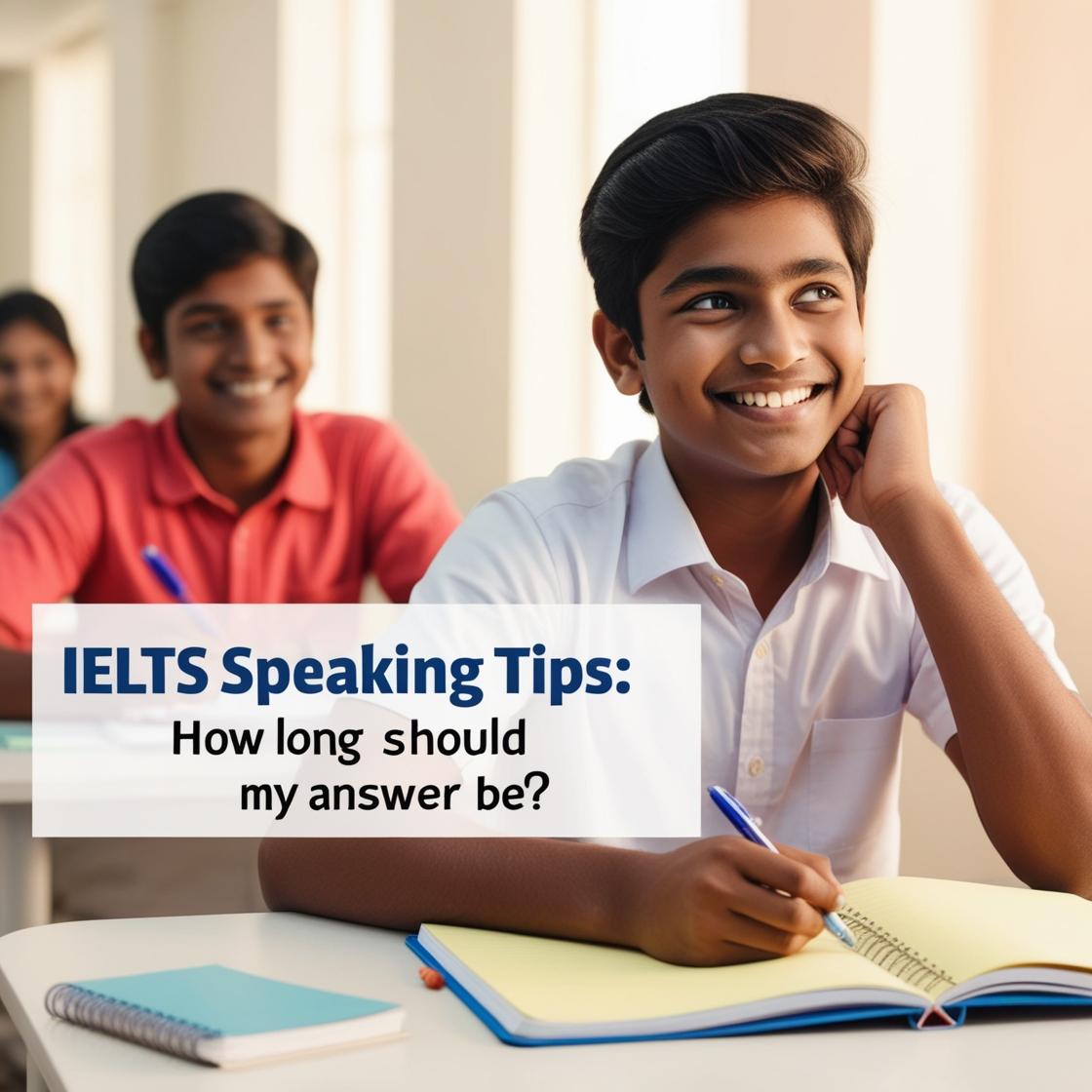Introduction
IELTS Speaking tips are essential for students preparing for the IELTS test, especially when it comes to understanding the ideal answer length in the Speaking section. The IELTS Speaking test evaluates your ability to communicate effectively in English. One common concern among test-takers is how long their answers should be. In this guide, we’ll discuss how to determine the appropriate answer length for each part of the IELTS Speaking test and share tips to help you excel.
Understanding the IELTS Speaking Test Structure
To understand the significance of answer length, it’s important to first familiarize yourself with the structure of the IELTS Speaking test. The test consists of three parts, each designed to assess different aspects of your speaking abilities.
Part 1: Introduction and Interview
This section serves as an icebreaker, where the examiner will ask general questions about yourself, your hobbies, interests, and background. This portion typically lasts around 4-5 minutes.
Part 2: Individual Long Turn
In this section, you’ll receive a cue card with a topic. You’ll have one minute to prepare before speaking on the topic for 1-2 minutes. This section tests your ability to organize your thoughts and deliver a clear, coherent monologue.
Part 3: Two-Way Discussion
The final part of the test is a two-way discussion with the examiner. The questions in Part 3 expand on the topic from Part 2. Here, you’ll need to express opinions, provide explanations, and engage in more abstract discussions. This part lasts about 4-5 minutes.
Why the Length of Your Answer Matters
In the IELTS Speaking test, answer length plays a crucial role in determining your score. Though there is no strict word limit, the examiner evaluates your speaking ability based on fluency, coherence, vocabulary, and grammar. Answer length is tied to how well you can express yourself in English.
Impact on Fluency and Coherence
Providing concise yet detailed answers demonstrates fluency and coherence. Short responses may make you sound less fluent, while excessively long answers can reduce clarity. To score well, aim for balanced answers that fully address the question without rambling.
Debunking Common Myths About Answer Length
Many test-takers mistakenly believe that longer answers are always better. However, focusing solely on the length of your responses can lead to redundancy or lack of coherence. Quality matters more than quantity—your answers should be relevant, clear, and structured.
Tips to Determine the Ideal Length of Your IELTS Speaking Answers
To strike the right balance in your responses, keep the following tips in mind:
1. Provide Full but Concise Answers
In each part of the IELTS Speaking test, aim to provide fully developed answers that address the question directly. Avoid overly short answers, as they may come across as incomplete. On the other hand, don’t go off-topic or speak at length without providing relevant details.
2. Tailor Your Answer Length to Each Part of the Test
The required answer length varies for each part of the test. For example:
- Part 1: Short answers (around 20-30 seconds) are enough.
- Part 2: Aim for 1-2 minutes of speaking, covering all aspects of the topic.
- Part 3: Provide detailed answers, supported by examples and explanations, lasting around 1-2 minutes.
Section-Wise Guide on Answer Length in the IELTS Speaking Test
Here’s a breakdown of the ideal answer length for each section:
Part 1: Introduction and Interview
In this part, brief answers are usually sufficient. Aim for 20-30 seconds per answer, providing just enough detail to fully address the question. For example:
Question: Do you enjoy spending time outdoors?
Ideal Answer: Yes, I enjoy spending time outdoors. Being surrounded by nature helps me relax. I often go hiking or visit parks when I want to clear my mind.
Part 2: Individual Long Turn
In Part 2, you have 1-2 minutes to speak. It’s crucial to structure your response by addressing all aspects of the topic. Here’s an example:
Topic: Describe a memorable travel experience.
Ideal Answer: One of the most memorable travel experiences I had was visiting the Taj Mahal in India. The monument’s intricate marble carvings and impressive architecture left me in awe. I walked around the gardens, taking in the beauty and peace. It was a once-in-a-lifetime experience that I’ll never forget.
Part 3: Two-Way Discussion
Part 3 requires longer, more thoughtful answers. Aim to speak for 1-2 minutes, providing your opinions and elaborating on your ideas. Here’s an example:
Question: How has technology impacted social interactions?
Ideal Answer: Technology has changed social interactions in many ways. On the positive side, it has made it easier to stay in touch with people worldwide through social media and messaging apps. However, face-to-face communication has decreased as people now prefer virtual conversations. It’s important to find a balance, ensuring that technology doesn’t replace real-life connections.
Common Mistakes to Avoid
To ensure your answers are neither too short nor too long, avoid these common mistakes:
1. Speaking Too Briefly or Rambling
Answer length is a balance. Short, underdeveloped answers can leave out key information, while excessively long answers may lack clarity. Practice speaking at a moderate pace and managing your time wisely.
2. Not Providing Enough Detail
While being concise is important, don’t sacrifice necessary detail. Provide examples and explanations to support your answers, demonstrating a range of vocabulary and grammatical structures.
3. Straying Off-Topic
Stay focused on the question at hand. Going off-topic can confuse the examiner and may reduce your score. Practice staying relevant and organized in your responses.
How to Avoid These Mistakes
To perfect the length of your answers, engage in regular practice with IELTS Speaking questions. Time yourself and evaluate the clarity, coherence, and relevance of your answers. Ask for feedback from teachers, language experts, or online resources to pinpoint areas for improvement.
Practice Techniques for Perfecting Answer Length
Here are some effective techniques for practicing the ideal answer length:
1. Use Practice Tests
Simulate real IELTS Speaking tests by timing yourself during practice sessions. This will help you adjust your answer length to fit the time constraints of each part.
2. Record and Evaluate Your Responses
Recording your answers allows you to assess their length and quality. Listen for areas where you may be rambling or providing insufficient detail.
3. Seek Constructive Feedback
Feedback from peers or teachers can highlight areas where your answers may be too brief or off-topic. Incorporate their suggestions to improve your responses.
Master IELTS Speaking with Kandor
At Kandor, we understand that answering confidently and effectively is key to excelling in the IELTS Speaking test. Our AI-powered platform offers personalized preparation tools designed to help you fine-tune your speaking skills, manage answer length, and improve fluency.
Whether you’re struggling to maintain a consistent speaking length or need expert guidance, Kandor can provide tailored resources to support your IELTS preparation.
Conclusion
Answer length plays a critical role in the IELTS Speaking test. By providing concise yet detailed responses, you can demonstrate your language proficiency effectively. With regular practice, strategic preparation, and attention to the requirements of each section, you’ll improve your speaking score.
Remember, quality matters more than quantity. Focus on providing relevant, clear, and well-organized answers, and you’ll be well on your way to success in the IELTS Speaking test.
Good luck!




















